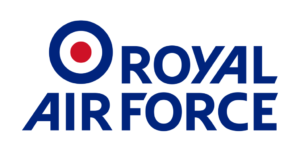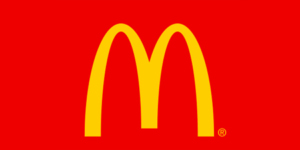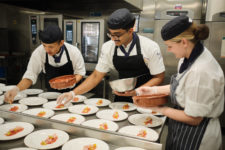
Restaurant Manager careers guide & job profile
As a Restaurant Manager you’re in charge of creating memorable experiences for customers.
Want real-life tips on how to become a restaurant manager?
Watch the video!
Getting into restaurant management careers
Every morning you’ll go into work, survey the restaurant and know this is your world, your castle – and you rule your domain. You’ll have tasted life on the restaurant floor as waiting staff, and maybe you’ll even have worked in a kitchen. You’ll know how to inspire your workers with a vision of delicious food for all. You’ll know what makes customers want to visit your restaurant and come back time and time again.
But a thriving restaurant that’s on everyone’s lips isn’t just about great food and amazing service. You’ll have a real business head on your shoulders, too. From how much money is going out to how best to make money come in, you’ll oversee every aspect of the business.
Working hours
It is not uncommon for a restaurant manager to work over 40 hours a week, often including weekends and evenings.
Shift work and working on public holidays is also typical.
When considering this role, it is important to remember that you must be willing to work until the job is completed, which may mean overtime.
How Much Money Can You Earn As a Restaurant Manager?
These LMI Job Trends give you a sneak peek of how much you could earn starting out for this career, and how much your salary could grow with experience.
Salary guide for restaurant management jobs
Restaurant managers working in fine dining typically earn between £22,000 to £40,000. In casual dining restaurants, between £20,000 and £30,000 and in fast-food restaurants between £18,000 and £30,000.
Salaries for restaurant managers depend on your location, employer and the type of establishment you work for. Many employers offer perks such as a pension, free meals on shift, staff discounts and private medical insurance. Additionally, it is sometimes possible for restaurant managers to receive bonus payments if they reach the targets set by their head office.
The income data above is from the Hospitality Guild and Prospects. These figures are intended as a guide only.
Skills you need to become a restaurant manager
Useful skills to put in your CV for restaurant manager jobs:
- ability to lead and motivate a team of staff
- awareness of hygiene, and health and safety regulations
- a flexible and hands-on approach to work
- problem-solving ability
- strong planning and organisational skills
- ability to work independently and make decisions confidently
- strong written and oral communication skills
- ability to cope under pressure in a fast-paced environment
- good business awareness
How do you get these skills?
Vocational qualifications and work experience will help you build these skills over time.
Build Your Skills With the FREE Young Professional Programme

What Qualifications & Training Do You Need For Restaurant Manager Careers?
School, College And Training
You’ll find GCSEs at grades 9-4 (A* to C) useful, especially in English and maths. You could also build up your skills and knowledge with a hospitality qualification. No-one magically knows how to run a great restaurant – there’s so much to learn, and a specialised qualification can help!
When considering what you need to enter the hospitality industry, practical experience, strong interpersonal skills and an understanding of business are key. Having a degree is not always a necessity as it’s possible to train on the job and work your way up into the role of a restaurant manager.
Hospitality Apprenticeships
If you want to get straight into a role and don’t have directly relevant qualifications or experience, you can train on the job and earn money at the same time by taking an apprenticeship in hospitality.
These are available at different levels. After gaining some experience you could take the:
- Hospitality and Catering Apprenticeship
- Food and Beverage Catering Management Apprenticeship
- Hospitality Management Higher Apprenticeship
- Level 3 Hospitality supervisor advanced apprenticeship
- Level 4 Hospitality manager higher apprenticeship
Once you are ready, the GOV.UK Find an Apprenticeship service can help you to find suitable positions.
Developing Your Skills With Training
If you want to develop your skills in the industry, the type of training opportunities available usually depend on the size of the restaurant you’d be working for and whether it’s an independent operation or part of a chain.
Larger restaurant chains typically offer structured training schemes, while independent restaurants are more likely to offer informal on-the-job training.
Key training areas include:
- First aid
- Health and hygiene
- Management skills
Career Progression
You might think that as a restaurant manager you’re already at the top of the food chain. However, with time and experience you could expand your reach to become a regional restaurant manager for larger chains.
You could also take your skills in a slightly different direction and become a hotel manager. Once you’ve got management experience in the catering industry, a lot of career doors are wide open to you.
Hospitality Management Training
Many large restaurant and fast food chains have management trainee schemes. A foundation degree or degree (along with hospitality and catering experience) will help you successfully apply for these.
A hospitality management trainee scheme is a not-to-be-missed way to work your way into catering management when you’re still young. You’ll gain insider knowledge and hands-on experience on the way, while getting a salary at the same time.
If you are currently working in a restaurant role you could develop your management skills by taking a relevant hospitality qualification such as:
- Level 3 Diploma in Hospitality Supervision and Leadership
- Level 4 Diploma in Hospitality Leadership
Hospitality Graduate Schemes
If you are interested in joining a graduate recruitment scheme you will need a degree. These schemes are usually available with large restaurants and fast-food chains. Having a degree in the following subjects could be beneficial when applying; business or management, hospitality management or hotel and catering.
Structured management training schemes for graduates generally last between 12 and 18 months. During this time, you could expect to gain practical experience within each function of the restaurant and be assigned a mentor to help you during your initial months.
Who Can Help?
Many professional bodies also offer a range of training opportunities, including activities that count towards continuing professional development (CPD). Find out more below:
- Hospitality Guild – lists training courses including college-based qualifications and apprenticeships, regulation and licensing courses, and CPD options.
- Institute of Hospitality – offers a range of hospitality-related qualifications, professional development workshops, webinars, online courses and networking events.
- UKHospitality – hosts various events across the year and provides publications and resources for members.
What Work Experience Do You Need For Restaurant Manager Jobs?
Work Experience Tips
You can start off building a relevant CV by getting work (part or full time) as counter service staff or waiting staff. This will help you learn the ins-and-outs of what it takes to make sure a restaurant runs smoothly. Whenever you take on a role – whether it’s customer service or catering or anything else – aim to soak up as much as you can, always put in that little bit extra into everything you do, and put yourself forward as someone your managers can trust to handle extra responsibility. That’s a good way to become a team lead.

What Does A Restaurant Manager Do?
Example restaurant manager daily job responsibilities
- Planning menus
- Managing work shifts and rotas for everyone
- Keeping a firm eye on stock control and budgets
- Working with food and drink suppliers
- Sticking to licensing laws and health and safety regulations (the last thing a customer wants to see on their plate is mouse droppings!))
- Hiring (and, sometimes, firing) staff – and organising their training.
Hospitality Heroes – Episode 1
Choose Hospitality! Meet Tom Kerridge and friends…
Hospitality Heroes – Episode 2
Choose Hospitality! Meet Jamie Jones and friends…
Hospitality Heroes – Episode 3
Choose Hospitality! Meet Luke Frost and friends…
Catering & Hospitality Career FAQs

What would you like to know about catering & hospitality careers? Maybe we can help!
How To Find Restaurant Supervisor Jobs: Next Steps
To find jobs for young people in this role, search on job boards for restaurant jobs with these words like these in the title:
- graduate restaurant manager jobs
- graduate restaurant supervisor jobs
- graduate hospitality management jobs
- hospitality management apprenticeships
- hospitality leadership training
These Youth Friendly Employers offer great opportunities
These Youth-Friendly Employers might be able to help you get great restaurant jobs, training or experience! Take a look.
Catering & Hospitality Career Tips & Opportunities
Catering & Hospitality Career Guides
View job descriptions with average UK salary, useful qualifications and a variety of routes into this career.
See All Our Youth-Friendly Employers

























YES! I Want More Free Careers Help...
So what are you waiting for? Grab your future.































